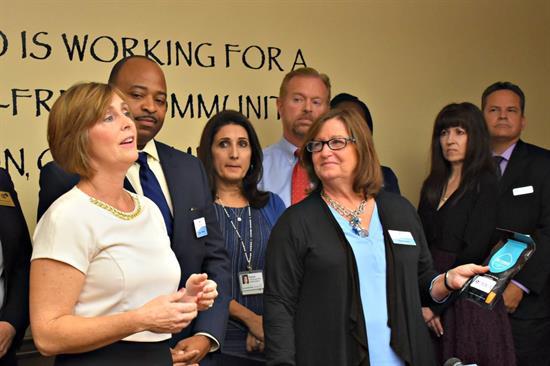U.S. Rep. Kathy Castor (FL14) announced today that the bipartisan “SUPPORT for Patients and Communities Act” that is aimed at combatting the opioid epidemic will provide new resources and tools for Florida families and community providers. The bill is on its way to the President’s desk after passing the U.S. House Friday and the Senate yesterday.
“Families have been struggling with opioid addiction for over a decade and the public health crisis demands action. In Tampa, I have met neighbors with substance use disorders and learned from their families, doctors, public health experts, prosecutors, law enforcement and substance use experts to understand how we can counter the crisis. They all have told me that more resources are necessary,” said U.S. Rep. Castor. “The bipartisan package is an important step in responding to the opioid crisis, but we cannot stop there. A sustained, long-term and substantial investment in community treatment will be necessary to truly provide the resources to families and communities to battle the opioid epidemic.
“There are aspects of the bipartisan package that can bring hope to families, help those currently dealing with addiction and provide resources to communities,” U.S. Rep. Castor continued.
“One commonsense provision in the package that I authored requires drug wholesalers that ship opioids to drug stores and clinics to take greater responsibility for reporting suspicious quantities to the Drug Enforcement Agency. DEA and drug manufacturers and distributors are required to work together to understand the number of manufacturers and distributors serving each pharmacy and practitioner, as well as the total quantity and type of opioids being delivered to each to better track and prevent the diversion of prescription opioids into illegal sales,” U.S. Rep. Castor stated. “The new law is necessary following a years-long investigation by my House Energy and Commerce Oversight and Investigations Subcommittee that uncovered shoddy reporting by drug wholesalers, such as Cardinal Health Inc. AmerisourceBergen, McKesson and Miami-Luken, Inc. who shipped massive amounts of opioids across the country and have tried to escape legal liability for doing so. This investigation came at the same time that the CEO of Cardinal Health Inc. received $11 million in compensation in 2017, the CEO of AmerisourceBergen received $9.9 million in total compensation in 2017 and the CEO of McKesson received $131 million, including $692 million in the ten years leading up to 2017 – when the distribution of pills was at an all-time high. The outrageous conduct by these companies and our committee hearing was featured on 60 Minutes on Sunday.”
The Opioids Package also includes several provisions to continue and expand federal grants to confront the epidemic, including state-wide grants to expand substance use disorder treatment and recovery services, state-wide grants to increase drug-disposal initiatives, grants for outreach and education to reduce the amount of opioids prescribed, grants to train first-responders on safety measures around fentanyl, cafentanil and other dangerous licit and illicit drugs and more federal grant opportunities. For example, Tampa Family Health Centers was awarded funds to help its clinics expand access to integrated substance use disorder and mental health services by the Health Resources and Services Administration (HRSA). The state of Florida also received resources from the Substance Abuse and Mental Health Services Administration (SAMHSA) and the Centers for Disease Control and Prevention (CDC).
“The bipartisan package must be seen as a first step,” U.S. Rep. Castor continued. “To truly turn the tide of the deadliest drug overdose epidemic in our history, we will need a sustained, long-term and substantial investment. We need to help the 90 percent of Americans with substance use disorders who are not getting treatment today and we need to expand funding for evidence-based treatment and wrap-around services that move people toward recovery.”
According to the Centers for Disease Control and Prevention (CDC), in 2016 there were more than 63,600 overdose deaths in the United States, including 42,249 that involved an opioid (66.4%). That's an average of 115 opioid overdose deaths each day. The number of opioid-related deaths in Florida, according to the CDC, ballooned from 2,634 in 2014 to 4,728 in 2016. Since 2000, the rate of deaths from drug overdoses in the state has increased 137 percent, including a 200 percent increase in the rate of overdose deaths involving opioids.
U.S. Rep. Castor serves as the Vice Ranking Member of the House Energy and Commerce Committee, which oversees healthcare policy, has conducted investigations into the role of drug manufacturers and distributors in the opioid crisis and continues to press the majority in Congress for a large scale plan to take on the opioid crisis.
“This epidemic must be taken head on and, while we are heading in the right direction, I call on my colleagues to continue tackling this crisis in an even larger, comprehensive way,” U.S. Rep. Castor said.
Read about Democratic priorities in the bipartisan SUPPORT for Patients and Communities Act here.
###


